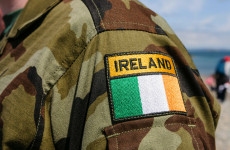Politics
Irish Government Moves to Repeal Triple Lock, Raising Concerns

The Irish government is advancing legislation to repeal the Triple Lock, a mechanism that mandates a United Nations (UN) mandate, as well as approval from the Dáil and the Government, before Irish soldiers can be deployed overseas. This decision has sparked significant concern among citizens and policymakers alike, particularly in light of recent comments by Minister for Health, Jennifer Carroll MacNeill, and the ongoing UN mission in Lebanon.
The Triple Lock is viewed as a cornerstone of Ireland’s military neutrality, aligning with the constitutional principle that all power derives from the people. The repeal of this mechanism without a public referendum is perceived by many as a breach of trust, especially given past commitments made during the ratification of the Nice and Lisbon Treaties in 2001 and 2008. Voters were assured that the Triple Lock would remain intact, ensuring that Irish troops would not serve under European Union (EU) command without a UN mandate.
Opposition to the repeal is mounting, as critics argue that it would effectively grant the government a “blank cheque” regarding military deployments. This concern is heightened by recent remarks from Taoiseach Micheál Martin, who suggested that Irish troops could potentially join a “reassurance force” to oversee a ceasefire in Ukraine. Critics contend that such commitments should not be made while the Triple Lock remains under consideration.
The implications of this potential policy shift could be significant. Many citizens fear that without the Triple Lock, Irish troops could be sent on missions with little oversight or public input, placing them at risk in increasingly volatile global situations. The prospect of Irish involvement in conflicts involving major powers, such as the ongoing situation in Ukraine, raises alarms about the country being drawn into complex geopolitical dynamics.
Supporters of the repeal argue that the current structure of the Triple Lock limits Ireland’s ability to respond to international crises effectively. They claim that it ties the country’s foreign policy too closely to the UN Security Council, which is often criticized for its inefficiency and gridlock. However, advocates for maintaining the Triple Lock counter that it is a necessary safeguard that reflects the will of the Irish people and preserves the nation’s commitment to neutrality.
The Peace and Neutrality Alliance (PANA), a prominent advocacy group, has voiced strong opposition to the repeal. Stephen Kelly, the Chairperson of PANA, emphasizes that the Triple Lock represents a fundamental principle of Irish foreign policy that prioritizes peace and neutrality. He argues that the government should focus on reforming the UN rather than abandoning its commitments to international law and diplomatic norms.
Critics of the repeal also highlight the historical context of Ireland’s military engagement. The country maintained a neutral stance during the World War II era, avoiding direct involvement in conflicts involving major powers. Advocates for preserving the Triple Lock assert that this historical precedent should guide current policy decisions.
Discussions surrounding the repeal of the Triple Lock have also prompted broader reflections on Ireland’s role in international affairs. Many citizens believe that any change to the country’s military deployment policies should be subject to public debate and democratic processes, including potential referendums.
As the legislative process unfolds, the government faces mounting pressure to justify its actions and engage with citizens on these critical issues. The future of the Triple Lock and its implications for Irish foreign policy remain a pressing topic as public discourse continues to evolve.
In conclusion, the proposed repeal of the Triple Lock has ignited a significant debate about Ireland’s military neutrality and its role in global affairs. As the government moves forward with this legislation, it is essential to consider the views of the public and the historical principles that have shaped the nation’s foreign policy.
-

 Entertainment1 month ago
Entertainment1 month agoAimee Osbourne Joins Family for Emotional Tribute to Ozzy
-

 Politics1 month ago
Politics1 month agoDanny Healy-Rae Considers Complaint After Altercation with Garda
-

 Top Stories3 weeks ago
Top Stories3 weeks agoIreland Enjoys Summer Heat as Hurricane Erin Approaches Atlantic
-

 World2 months ago
World2 months agoHawaii Commemorates 80 Years Since Hiroshima Bombing with Ceremony
-

 Top Stories2 months ago
Top Stories2 months agoFianna Fáil TDs Urgently Consider Maire Geoghegan-Quinn for Presidency
-

 World2 months ago
World2 months agoGaza Aid Distribution Tragedy: 20 Killed Amid Ongoing Violence
-

 World2 months ago
World2 months agoCouple Convicted of Murdering Two-Year-Old Grandson in Wales
-

 World2 months ago
World2 months agoAristocrat Constance Marten and Partner Convicted of Infant Murder
-

 Top Stories2 months ago
Top Stories2 months agoClashes Erupt Between Far-Right Groups and Migrants in Spain
-

 Top Stories2 months ago
Top Stories2 months agoHistoric Dalkey Pub The Queens Reopens Under New Management
-

 World2 months ago
World2 months agoTrump Defends FBI Deputy Director Amid Epstein Files Controversy
-

 Politics2 months ago
Politics2 months agoTragic Crowd Surge at Gaza Aid Center Claims 20 Lives









